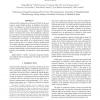Free Online Productivity Tools
i2Speak
i2Symbol
i2OCR
iTex2Img
iWeb2Print
iWeb2Shot
i2Type
iPdf2Split
iPdf2Merge
i2Bopomofo
i2Arabic
i2Style
i2Image
i2PDF
iLatex2Rtf
Sci2ools
ICASSP
2011
IEEE
2011
IEEE
Automatic diagnosis of ADHD based on nonlinear analysis of actimetry registries
Attention-Deficit Hyperactivity Disorder (ADHD) is the most common mental health problem in childhood and adolescence. Its diagnosis is commonly performed in a subjective manner since current objective measurements are either expensive or time-consuming. However, subjective methods tend to overestimate the severity of the pathology. In this paper, we propose a novel methodology for automatic diagnosis of ADHD based on signal processing methods. The method is constructed in two stages: 1) An automatic activity/rest detection filter which allows for a separate analysis of both types of periods and 2) A feature extraction module based on nonlinear regularity quantification of either the global signal or the detected epochs. Results on real data show that the proposed methodology can discriminate between patients and controls with sensibility and specificity values approaching 80%.
Attention-Deficit Hyperactivity Disorder | Current Objective Measurements | ICASSP 2011 | Mental Health Problem | Signal Processing |
| Added | 20 Aug 2011 |
| Updated | 20 Aug 2011 |
| Type | Journal |
| Year | 2011 |
| Where | ICASSP |
| Authors | Diego Martin, Pablo Casaseca, Susana Alberola, Jose Antonio Lopez, Francisco Carlos Ruiz, Jesus Maria Andres, Jose Ramon Garmendia, Julio Ardura |
Comments (0)

